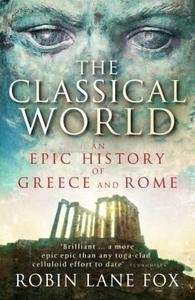The Classical World
An Epic History of Greece and Rome

Editorial Penguin UK
Fecha de edición julio 2006
Idioma inglés
EAN 9780141021416
720 páginas
Libro
encuadernado en tapa blanda
Resumen del libro
The classical civilizations of Greece and Rome dominated the world for centuries and continue to intrigue and enlighten us with their inventions, whether philosophy, politics, theatre, athletics, celebrity, science or the pleasures of horse racing. Robin Lane Fox's spellbinding history spans almost a thousand years of change, from the foundation of the world's first democracy in Athens to the Roman Republic and the Empire under Hadrian. Bringing great figures such as Homer, Socrates, Alexander, Julius Caesar, Augustus and the first Christian martyrs to life, exploring freedom, justice and luxury, this wonderfully exciting tour brings the turbulent histories of Greece and Rome together in a masterly study.
Extract from The Classical World by Robin Lane Fox
The 'classical world' is the world of the ancient Greeks and Romans, some forty lifetimes before our own but still able to challenge us by a humanity shared with ours. The word 'classical' is itself of ancient origin: it derives from the Latin word classicus which referred to recruits of the 'first class', the heavy infantry in the Roman army. The 'classical', then, is 'first class', though it is no longer heavily armoured. The Greeks and Romans did borrow from many other cultures, Iranian, Levantine, Egyptian or Jewish among others. Their story connects at times with these parallel stories, but it is their own art and literature, thought, philosophy and political life which are correctly regarded as 'first class' in their world and ours.
In this world's long history, two periods and places came to be seen as particularly classical: fifth- and fourth-century BC Athens was one, while the other was Rome from the BC to AD 14, the world of Julius Caesar and then Augustus, the first Roman emperor. The ancients themselves shared this perspective. By the time of Alexander the Great they already recognized, as we still do, that particular dramatists at Athens in the fifth century BC had written 'classic' plays. In the Hellenistic age (c.330-30 BC) artists and architects adopted a classicizing style which looked back to the classical arts of the fifth century. Then Rome, in the late first century BC, became a centre of classicizing art and taste, while classical Greek, especially Athenian Greek, was exalted as good taste against 'Eastern' excesses of style. Subsequent Roman emperors endorsed this classical taste and as time passed, added another 'classic' age: the era of the Emperor Augustus, their Empire's founding figure.
My history of the classical world begins from a pre-classical 'classic', the epic poet Homer whom the ancients, like all modern readers, acknowledge as simply in a class of his own. His poems are the first written Greek literature to survive. From them onwards, I shall explore how 'classical Greece' of the fifth and fourth centuries BC evolved and what it stood for, up to four hundred years after Homer's (probable) date (c.730 BC). I then turn to Rome and the emergence of its own classical age, from Julius Caesar to Augustus (c.50 BC to AD 14). My history ends with the reign of Hadrian, the Roman emperor from AD 117 to 138, just before the first surviving use of the term 'classics' to describe the best authors: it is attested in the conversation of Pronto, tutor to the children of Hadrian's successor in Rome.
From Homer to Hadrian, our knowledge of the classical world is not standing still, and this book is an attempt to follow its highways as Hadrian, its great global traveller, never did.
Biografía del autor
Robin Lane Fox es fellow emérito del New College de Oxford, fue profesor titular de la Universidad de Oxford y colaborador habitual del Financial Times desde 1970. Entre sus libros destacan Pagans and Christians (1987), La versión no autorizada: verdad y ficción en la Biblia (1992), Alejandro Magno (2007) y su gran éxito El mundo clásico. La epopeya de Grecia y Roma (Crítica, 2007).








